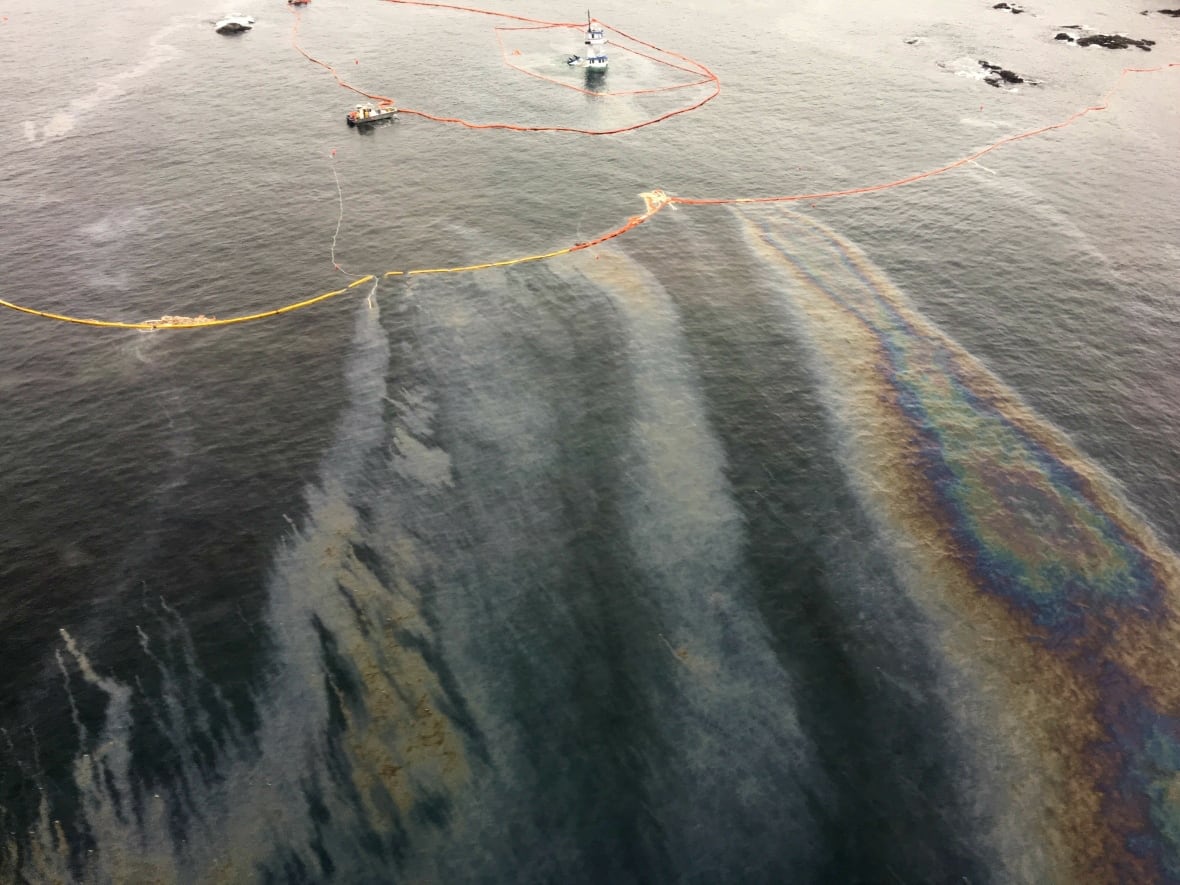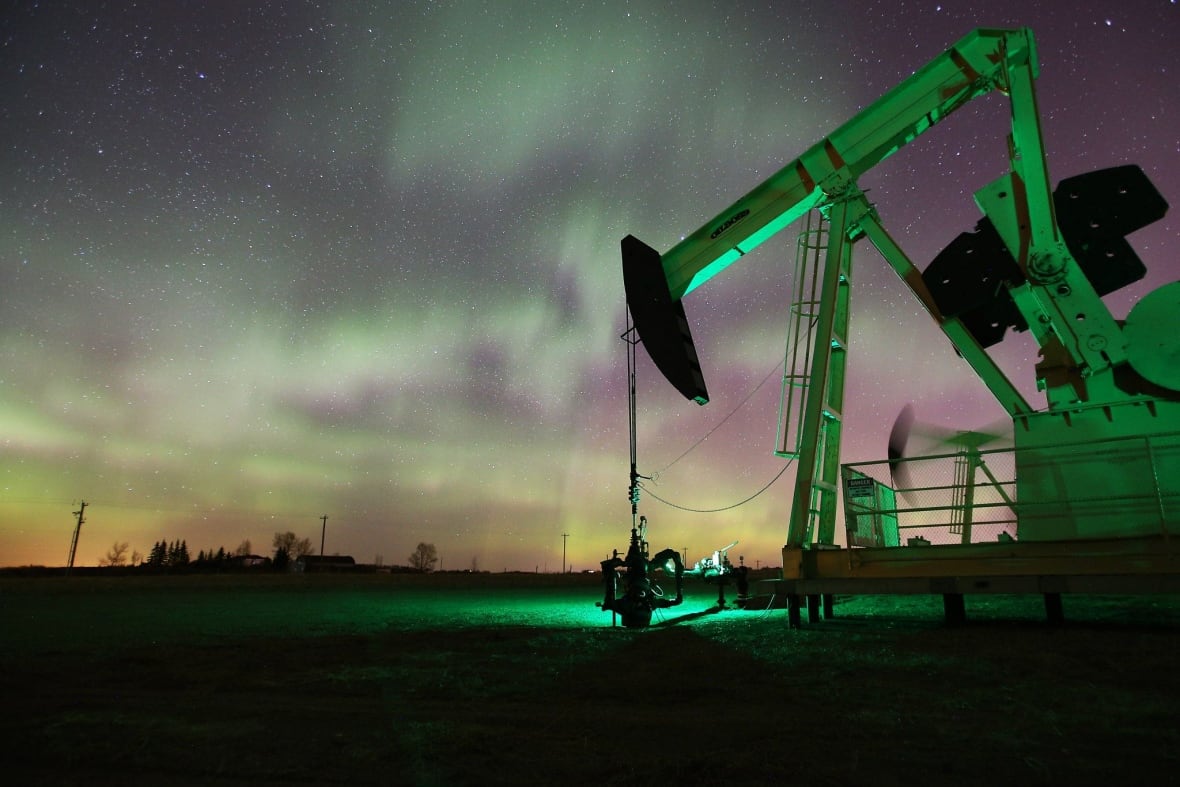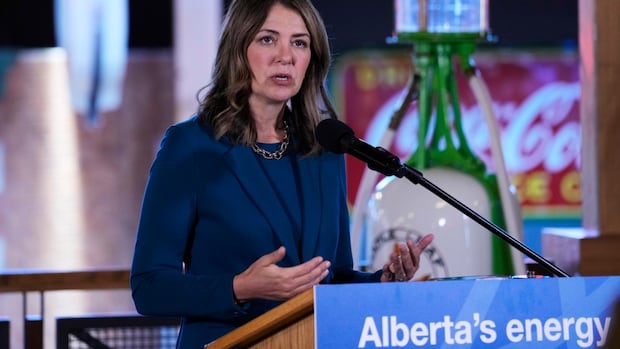After Alberta Premier Danielle Smith announced on Wednesday her government’s intention to champion an application to the federal Major Projects Office for a new oil pipeline to the northwest coast of British Columbia, the reaction came fast and, in some cases, furious.
Numerous groups lined up with excitement and anticipation to back the premier’s plans, while a host of others expressed reservation, doubt, fear and anger.
The premier wasted no time making her case directly to the jurisdiction most likely to stand in the way: British Columbia.
The Alberta government is proposing a new taxpayer-funded pipeline project that would extend to B.C.’s northwest coast. Premier Danielle Smith spoke with CBC’s Stephen Quinn to pitch why she believes B.C. should get on board with the proposal, which has yet to be supported by B.C Premier David Eby or Indigenous leaders.
“It’s very important for us to be able to get people on board with all of these nation-building projects; this is going to require co-operation between British Columbia and Alberta,” Smith said.
“It’s going to require a lot of Indigenous consultation with both Alberta bands as well as nations in British Columbia. And we want the consultation to begin early. We want it to be successful.”
Judging from some of the initial response, however, that might be an uphill battle. A number of First Nations in B.C. quickly expressed their opposition to Smith’s plan, as did B.C. Premier David Eby.
At the same time, the proposed pipeline — which has no specific route as of yet or private backer to actually build and operate it — did receive a fair share of enthusiastic support from business groups and federal Conservative Leader Pierre Poilievre.
One thing is for certain: there are plenty of opinions about what Smith has put on the table.
Here’s a sample of what’s been said so far.
B.C. First Nations
Marilyn Slett, president of the Coastal First Nations-Great Bear Initiative and the elected chief of the Heiltsuk Tribal Council, said there is deep and adamant opposition to a pipeline among the people she represents.
“We, along with the communities and municipalities of the north and central coast and Haida Gwaii, have fought to keep crude oil tankers out of our territorial waters for over 50 years,” Slett said in a statement.
“This is not a decision we take lightly; it represents decades of community engagement and consultation.”
Slett pointed to a 2016 oil spill as one of the main reasons that the tanker ban went into place. The Nathan E. Stewart tugboat spilled 110,000 litres of diesel and heavy oils in the water near Bella Bella, in Heiltsuk territories, and Slett said the area hasn’t recovered.

“Premier Smith’s continued talk of oil pipelines and tankers, and the risk of a catastrophic oil spill in B.C.’s coastal waters, is not nation building,” she added. “In fact, it risks the goodwill and support of First Nations for more realistic and economically valuable nation-building projects in B.C. and beyond.”
Slett later told CBC News: “This is not something that we would ever support. There is no project that … we would ever support the lifting of that moratorium.”
The Union of British Columbia Indian Chiefs echoed that sentiment.
“Any proposal to ram a new oil pipeline through to B.C.’s North Coast is a direct assault on the inherent and constitutionally protected title and rights of the First Nations who steward these lands and waters,” Grand Chief Stewart Phillip said in a statement.
Linda Innes, elected chief councillor of Gitxaała Nation, said its leaders have a “duty to protect our territory for our future generations,” and her people have been “steadfast and clear that the risk of a pipeline or tanker on our lands, waters, community and way of life is too great” to accept.
“Attempts to use empty promises from engagement or consultation to clear the way for any pipeline is an old and tired ploy — one that Gitxaała is more than familiar with,” she said in a statement.
Business groups
The Canadian Association of Petroleum Producers supports the Government of Alberta’s plan.
“Building pipelines in Canada has proven to be a significant challenge and requires a highly co-ordinated, transparent and collaborative approach, including meaningful engagement with Indigenous communities early in the process,” association president and CEO Lisa Baiton said in a written statement.
“The Alberta government is applying the lessons learned from recently completed projects and taking a unique approach to de-risk a West Coast pipeline, which can open up a new pathway for growth for Canada’s oil producers and encourage new private investment.”

Baiton added: “To truly realize our potential as global energy supplier, we need to continue to act to build a stronger, more competitive oil and natural gas sector that can provide safe, secure and reliable energy to both Canadian and international markets.”
The Business Council of Alberta had a similar perspective.
“This is about building prosperity across the country,” the organization, which represents many chief executives and entrepreneurs in the province, said in a statement.
“There is no roadmap to making Canada the strongest economy in the G7 that does not include the full acceleration of the energy sector. A new pipeline would not only unlock Alberta’s resources but also create broad benefits for all Canadians, including greater economic growth, job creation, fiscal sustainability and expanded trade opportunities to new markets.”
Deborah Yedlin, president and CEO of the Calgary Chamber of Commerce, said worsening trade relations with the United States make a new pipeline even more economically important.
“With Canada’s energy sector accounting for a quarter of the country’s international exports and a cornerstone of both our provincial and national economies, improving market access is essential to the sector’s long-term viability, especially amid growing trade uncertainty and a steady decline in exports to the United States,” she said in a statement.
“A new pipeline, advanced and de-risked by the Government of Alberta, would attract investment and promote economic growth across the country.”
Climate and environmental groups
Janetta McKenzie with the Pembina Institute, a clean energy think tank, said the Alberta government is overstating the benefits of a new pipeline while glossing over the risks.
“I was concerned that the premier and her ministers made no mention of the downside risks of a new pipeline, from runaway climate-changing emissions to expanding tailings ponds and increasing threats to our water, air and land,” she said in a statement.
“This is not what nation building looks like.”

McKenzie pointed to a recent Pembina Institute analysis showing “oil and gas job creation around the world is increasingly disconnected from production and profit levels.”
“Many Alberta families are living through that pain right now following the recent layoffs at Imperial Oil and Cenovus,” she said.
“These developments are reminders that the oilsands industry in Alberta is engaged in short-term behaviours to maximize profits in the here and now, but don’t set them up for long-term expansion, because oil demand across key markets is already softening.”
Aly Hyder Ali with the advocacy group Environmental Defence described the Alberta government’s pipeline announcement as “nothing but a farce.”
“There is no private company behind the project, no committed investors and no clear plan — just a province stepping into a paperwork process, desperate to keep the idea of a new oil pipeline alive,” he said in a statement.
“Beyond the economics, a northern pipeline would cut through some of Canada’s most sensitive ecosystems and Indigenous territories, threatening key species, forests and waterways that are already under stress from climate change.”
Analysts and others
Analysts with CIBC said in a report they “applaud” Smith’s plan to spur development of a new oil pipeline to the Pacific Ocean but expressed doubts it will succeed, given the political and economic hurdles that stand in the way.
“It may be a long road ahead to move a pipeline from the development stage to a sanctioned project, even with the newly created Major Projects Office under the Building Canada Act,” the report said.
“Despite campaigning on a promise to render final decisions on projects on a maximum two-year timeline, the timelines were notably absent from the act.”
The analysts also noted that only one project has been approved since 2019 under existing federal legislation that Smith wants to see scrapped: the Impact Assessment Act.
Meanwhile, Clean Prosperity, a climate policy organization that advocates for a low-carbon economy, expressed support for a pipeline provided it is “pursued in tandem with decarbonization.”
“It’s what the world wants, and it’s what we need to deliver together as a country,” Michael Bernstein, the group’s president and CEO, said in a statement.
“This pipeline, combined with the construction of the Pathways carbon capture project, could be the next phase of a grand bargain between the federal and Alberta governments. This is a project that could help fulfil our shared provincial and national ambition to be an energy superpower, while protecting our long-term carbon competitiveness.”







